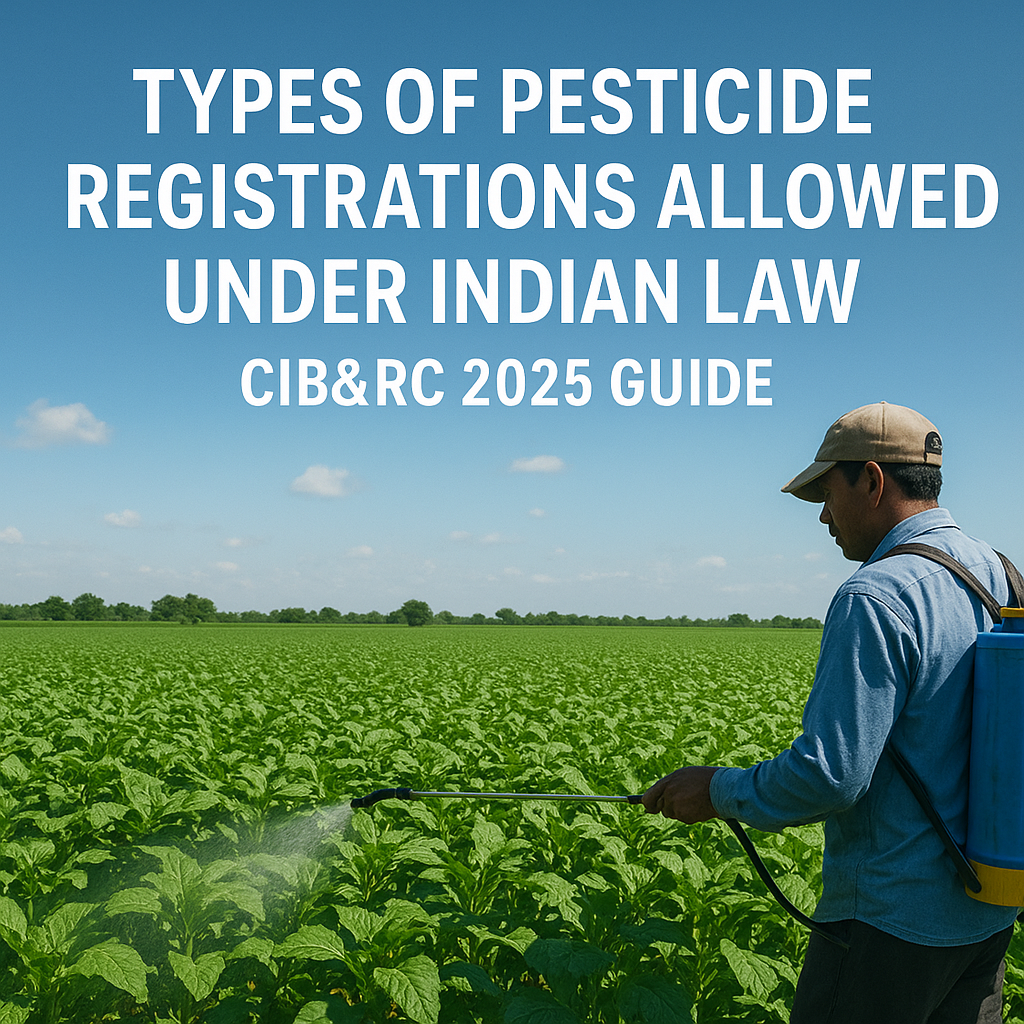Get a Free Step-by-Step FCO Registration Guidance!
Our regulatory team will share the latest compliance checklist for bio-stimulant registration and answer your queries — No obligation!
Types of Pesticide Registrations Allowed Under Indian Law | CIB&RC 2025 Guide
There is high dependency of the agricultural sector in India on the use of pesticides in crop protection, pest control and achievement of food security. The pesticides used nevertheless are bound by stringent laws to safeguard the health of people, the environment and trade. The Central Insecticides Board & Registration Committee (CIBRC) is the highest institution that controls the registration of pesticide in India as per the act, the Insecticides Act, 1968.
The present guide describes the kinds of pesticide registrations in India which are Section 9(3) registration, me-too registration under Section 9(4), provisional registrations and a special consideration to bio-pesticides and import.
As a manufacturer, importer or distributor, it would be important to familiarize yourself with these categories to avoid legal penalization and business hiccups.
Overview of CIBRC Pesticide Registration in India
CIBRC Registration of pesticide registration strives to be safe, good, sustainable and that any product that arrives in the Indian market is appropriate. All the pesticides whether the domestic production or those imported should be put through an approval process before they are sold. Installation of a product is authorized by the Registration Committee based on scientific, toxicological, efficacy and environmental impact reports.
There are various categories of pesticide registrations maintained by CIBRC according to product type, origin and its use. These are technical-grade pesticide registration, formulated products, bio- pesticide registration and household products registration etc. This will guarantee that every product will be evaluated accordingly as per its risk profile and method of application.
Key steps in the pesticide regulatory process in India
- Application Submission– Applicants fill in a detailed application complete with all necessary technical information.
- Preliminary Screening– CIBRC looks at whether the documents are complete.
- Technical Review– Scientific committees review toxicology, residue, efficacy and environmental safety data.
- Field Trials– This is done in approved locations when testing the performance of the product.
- Registration Committee Decision– Granting approval or provisional approval or rejection.
Post-Registration Monitoring– Making sure whether label claims and restrictions are being used.
Main Types of Pesticide Registrations in India
The structure of pesticide registration done in India follows the regulation of the Insecticides Act. The kinds of registration are different in terms of purpose– who can be registered and the data requirements.
Section 9(3) Pesticide Registration – Regular approval for new products
Section 9(3) registration is given to a newly registered pesticide in a situation where it has not been registered in India. This is the most complete type of approval and involves all the data on chemistry, toxicology, efficacy, environmental safety and residue analysis. Manufacturers that present a new active ingredient or formulation in the Indian market usually seek it.
- Purpose: Innovation of new molecules/ formulations.
- Conditions: Completion of full dossier, large field trials and lab tests.
Validity: Only under conditions of compliance is registration valid.
Provisional Registration of Pesticides in India (Section 9(3B)) – Conditional approval before full data submission
In Section 9(3B), provision can be made to provisional registration of a pesticide up to a maximum of two years so that the applicant might complete all the obligatory studies. This will enable access to the market prior to the normal market entry by critical products required to control the pest use with the data beforehand of safety and efficacy.
The purpose: Emerging necessity to control pests or to stimulate innovations.
Conditions: There should be submission of remaining studies by the applicant during the provisional period.
Result: converted to full registration at the time of successful data submission.
Me-Too Pesticide Registration (Section 9(4)) – Approval for products similar to already registered ones
When a company wishes to register a similar structure to an already registered pesticide, the product can be registered under Section 9 (4) which is a Me-too registration. This saves a lot of cost and time taken to approve.
- Intention: Promote competition on the market.
- The requirements: Evidence of the similarity of the composition, specifications and intended use.
Advantage: Saving on R&D expense and quicker marketplace payoff.
Deemed to Be Registered Pesticides – Automatic approval under specific conditions
Some pesticide products, which were already granted license under the previous regime of licensing or before the Insecticides Act came into effect are supposed to be treated as being registered. They also do not need new registration, unless any modification in the formulation or use has been made.
Intent: Shorten transition from old system.
Criteria: the composition formulation or an intended use have not been altered.
Technical vs Formulated Pesticide Registration
Technical-grade pesticides (pure active ingredient) as well as formulated products (ready-to-use mixture) must be registered according to the Indian law. Its approval procedure differs because of the different risk profile projected by each.
Regulatory requirements for each category
Technical Pesticide Registration: Needs additional information concerning chemistry, manufacturing process, impurity profile and toxicological data.
Formulated Pesticide registration: The registration entails composition requirements, formulation stability, compatibility of packaging and bio-efficacy data.
Difference: Technical registration is concerned with the active ingredient; formulated registration is concerned with the end product which will be released to the field.
Bio-Pesticide and Biological Pesticide Approval in India
In India, bio-pesticides are showing an upward trend to substitute chemical pesticides in bio-friendly and organic agricultural regimes. Among them are microbial pesticides (bacteria, fungi and viruses), extracts of plants and biochemical pesticides based upon natural materials.
CIBRC has customized the bio-pesticide registration process to the special nature of the product through a process that puts emphasis on pathogenicity, host specificity, residue level and environmental safety and not the mainstream toxicology demands of the synthetic pesticides.
Detailed information concerning product composition, method of action, efficacy of the product against the target pests and storage stability should be submitted by applicants. Though it takes a bit shorter time to grant approval on biological pesticide registration, requirements that it has to be in line with the safety standards and undergo laboratory tests in approved labs are still required.
By 2025, the emergence of demands in bio-pesticide registered products and the government and sector incentives to sustainable agriculture registering your own bio-pesticide will be an appealing option for domestic producers and importers.
Process for Pesticide Import Registration in India
The importers should register any pesticide they may feel to import to India, either technical or formulated. It involves:
- The submission of applications with overseas production information and certificate of authorization.
- Equivalence Testing to match or compare specifications of imported Pesticides to Indian ones.
- In India, it has to be tested and field trials conducted to validate performance against local conditions.
- Customs clearance service is done upon receiving the CIBRC registration.
This will provide assurances that imported pesticides will go through the same process as the local ones in terms of safety and performance requirements.
Data Requirements for CIBRC Pesticide Registration
Data requirements of CIBRC pesticide registration are extensive and differ according to the category of pesticide being registered either as a technical-grade product, formulated pesticide, bio-pesticide or imported product. In the application, the chemical information is to be given in detail including the molecular structure, purity level, process of manufacturing and profile of impurities.
Toxicological investigations including acute toxicity, sub-chronic, and chronic toxicity are also compulsory in determining the effects on the health of a human being and animals. Residue studies are necessary to infer that safe pre-harvesting intervals and maximum residue limits (MRLs) should be met.
In the case of plant protection products bio-efficacy should work against target pests in local agro-climatic conditions. Also, environmental safety studies take into consideration the possible effects to soil, water, beneficial insects and non-target organisms. All the research is supposed to be carried out at CIBRC-approved or GLP-approved laboratories and the data should be delivered in the described format to eliminate the delay in approval.
Such a strict procedure of submitting data means that safe, effective and environmentally friendly pesticides can be used in India.
Mandatory studies and safety evaluations for plant protection products
- Chemical and process manufacturing information.
- Toxicology testing (acute, sub chronic, chronic).
- Analysis of residues in order to establish the safe pre-harvest intervals.
- Bio-efficacy trials against pests.
- Research on environmental safety involving soil, water and non-target species.
Best Practices for Pesticide Compliance in India
- Maintain detailed product lifecycle documentation.
- Keep technical data and test reports organized and accessible.
- Ensure labels match approved claims exactly.
- Stay updated with CIBRC regulatory changes.
- Partner with certified labs and train staff on compliance standards.
CIBEC pesticide registration regulations ensure that the market approves of a drug and does not expose them to great expenses in the name of penalties or product prohibition. Manufacturers, importers and distributors ought to develop rigorous systems of documentation that would trace each step of the product lifecycle management process that include sourcing raw materials to final packages.
Technical documents, test reports, and quality controls are all to be kept organized and able to be audited according to an easy retrieving format. The approval of the labels and packaging must be carried out according to the specifications laid and this includes the dosage instructions, safety precautions and cautious steps to be taken in usage. It is also necessary to keep track of the periodic updates of the CIBRC guidelines and be proactive towards the changing requirements including corrected residue limits and or new environmental safety tests.
Additional partnerships with certified laboratories, prescribed interior checks of conformity and staff training to the pesticides regulation standards may decrease the non-compliance risk as well. Adherence to these best practices means that the companies will be able to get their approvals within a short time, keep their products credible and ultimately remain in the Indian pesticide market long
Common Mistakes to Avoid
Documentation and record-keeping tips for smooth approval
Have a database of all technical data as well as test reports.
Maintain records of manufacturing in batches to identify the trace.
Make sure that labels and leaflets perfectly coincide with approved statements and instructions.
Presenting incomplete dossiers.
Testing in uncertified laboratories.
Not following the changes in CIBRC guidelines.
100% verified listings in India
Expert local advisors in India
Provide Best Exclusive deals
Transparent all paperwork
📞 Ready to Contact Us?
Contact our experts at United Enterprises CIB Consulting today.


Frequently Asked Questions
Section 9(3), 9(3B), 9(4), and deemed registration categories.
Full registration requiring extensive data for new pesticides.
Temporary approval for two years pending complete data submission.
Registration of products similar to already approved pesticides.
Chemical, toxicological, residue, efficacy, and environmental safety data.



